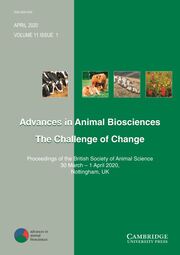The Proceedings of the LiveM 2016 Conference constitute extended abstracts of papers presented at the conference Modelling Grassland-Livestock Systems Under Climate Change held in Potsdam, Germany, 15–16 June 2016. The meeting was organised in association with PIK (Potsdam Institute for Climate Impact Research) and ATB-Potsdam (Leibniz Institute for Agricultural Engineering Potsdam-Bornim) with funding from the Research Council of Norway.
The conference was organised within the livestock and grassland modelling (LiveM) theme of the FACCE-JPI Knowledge Hub MACSUR, which brings together >70 institutes from 18 countries, to improve capacity in modelling the impacts of climate change on agriculture, and how these impacts are affected by adaptation and mitigation strategies. It was held at the historic PIK campus in Potsdam, and attended by around 50 modellers and experimental researchers with expertise in livestock and grassland production (Figure 1). The conference
-
∙ Presented advances in the modelling of grassland-livestock production systems in the context of future food security and sustainable production under climate change.
-
∙ Highlighted the future challenges and research priorities for livestock and grassland modelling.
-
∙ Brought together modellers across nations and disciplines to share ideas, spread best practice and develop new collaborations as part of an integrated research community.
The presented papers have been edited. Views expressed in all contributions are those of the authors. This publication contains all extended abstracts that were available at the time of going to press.

Figure 1 Delegates and organisers of the LiveM 2016 conference on the steps of the Michelson-Haus, PIK, Potsdam, Germany, 16th June 2016.



